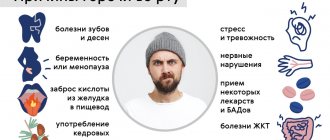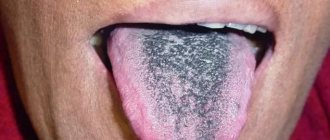What does bitterness in the mouth mean after eating or in the morning: causes and treatment
Bitterness in the mouth is a fairly widespread phenomenon, many people are familiar with it. This is especially true for those who suffer from pathologies associated with the gallbladder, liver, bile ducts, and organs of the digestive system. Why does this symptom occur?
The causes of altered taste are often spicy, fatty, spicy foods, and medications used over a certain period of time. A person suffering from congenital problems with the bile ducts also “puts up” with the taste of bitterness. Constant bitterness in the mouth (and not only after eating) indicates the presence of a serious disease that requires correct diagnosis and adequate treatment.
Bitterness in the mouth - what does it mean?
The main cause of a bitter taste in the mouth is the reflux of bile into the esophagus, which occurs when the liver, gallbladder and biliary tract are not functioning properly. Bile is a digestive fluid that is produced by liver cells and accumulates in the bladder. Here it is not only stored, but also “ripens” and acquires a full acid-salt composition. After “ripening,” the bile enters the duodenum, where it initiates the digestion process.
Bile secretion has a characteristic bitter taste. Healthy mature bile has a certain composition. In addition to acids and metal salts (sodium and potassium), the secretion contains proteins, phospholipids (fats for building cell membranes), cholesterol, chlorine and calcium ions. An unbalanced composition of bile leads to the precipitation of salts. This is how clots, flakes, sand and stones form in the gallbladder. They impede the outflow of secretions, forming stagnation in the bladder and ducts. In addition, the cause of stagnation is often a spasm that accompanies stress and nervous experiences (fear, hostility, anger, hatred).
Against the background of stagnation, the release of new bile continues, which tends to enter the bladder. The human liver secretes up to 1 liter of bile secretion per day. This creates pressure, which forcefully pushes the stagnant secretion, throwing it into the stomach and esophagus.
Treatment of bitterness with folk remedies
Herbal medicine is appropriate in complex treatment under the supervision of a specialist. Chamomile infusion, flax seed jelly, and corn silk decoction will help get rid of such an unpleasant symptom. Therapy with freshly squeezed juices has proven itself well. For this purpose, potato is used, which activates the intestines and eliminates heartburn, carrot, beetroot, which is effective for diseases of the biliary tract, and cucumber. Juices have a general strengthening effect, help cleanse the organs of toxins and normalize digestion processes.
When and how often does the bitter taste occur?
From when bitterness appears in the mouth, we can guess what causes this symptom:
- During physical activity, if it is also accompanied by heaviness in the right side, it may be a sign of liver disease.
- In the morning - the reason most likely lies in problems with the liver and gall bladder.
- Only after eating too heavy, fatty foods, after overeating - diseases of the gallbladder, bile ducts, liver.
- Bitterness appears after any meal - diseases of the stomach, duodenum, gall bladder, and some liver pathologies.
- Short-term bitterness in the mouth - during a stressful situation or the use of medications that affect the liver and gastrointestinal tract.
- Constant bitterness in the mouth - a possible cause is cancer of the gastrointestinal tract, cholelithiasis, cholecystitis, endocrine or mental illness.
Gallbladder and liver diseases
If the taste of bitterness in your mouth has become your constant companion, then the first thing to rule out is stagnation of bile, which occurs due to pathologies of the gallbladder and liver. Bile is produced in the liver, then it enters the gallbladder, where it is stored until food enters the stomach. This beneficial liquid helps the stomach digest food. As soon as you eat, bile enters the duodenum - this is a natural phenomenon. With pathologies of the gallbladder and liver, the fluid does not come out completely or stagnates, a lot of it is formed, and a bitter taste appears in the mouth.
Appears after eating cedar
After eating pine nuts, even a completely healthy person may experience bitterness in the mouth. Usually this phenomenon is mistakenly attributed to the choleretic properties of the product, but such a reaction cannot occur with high-quality pine nuts.
Meanwhile, bitterness in the mouth appears immediately after eating and lasts for several days; sometimes other symptoms of intoxication may appear - nausea and pain in the liver area. All this clearly indicates that the pine nuts were artificially grown and imported from China. Many suppliers pass off Chinese nuts as domestic products, since they are cheaper to purchase. But there are many reasons why it is better to refuse such a food product.
To which authorities should well water be submitted for analysis?
You can only obtain a guarantee of high-quality testing of well water, as well as an accurate conclusion about the reasons for its bitterness, in an accredited independent laboratory that has all the necessary approvals, certifications and licenses. After conducting detailed analyses, chemists issue official certificates and protocols on the suitability of the well for drinking or using water for household purposes.
You can also contact the centers for hygiene and epidemiology, the laboratory of the regional branch of Vodokanal, or an organization that specializes in geological exploration and solves problems of water purification.
The main causes of bitterness
What does bitterness in the mouth indicate? There are actually a lot of reasons why a person begins to feel this. In this way, the body may try to “indicate” diseases of the digestive system or a gallbladder disease. This sensation may also be a sign of poor nutrition or taking medications of various spectrums for too long (mainly those used to treat the liver).
The main causes are diseases of the gastrointestinal tract (GIT):
- Diseases of the duodenum. Bile from the duodenum, entering the stomach, causes corrosion of its walls. Bile contains acids that cause a feeling of bitterness.
- Gastritis (see symptoms and treatment of gastritis). With this disease, the composition and amount of gastric juice produced by the body changes, the process is also accompanied by poor digestibility of proteins, fats, carbohydrates and other vitamins, and the removal of toxins worsens. Together, this causes heartburn, bad breath, constant belching and, accordingly, an unpleasant taste in the mouth.
- Gastric dyspepsia. The cause of the bitter taste may be difficult digestion caused by disruptions in the functioning of the stomach.
- Gastroesophageal reflux disease. This disease provokes surges of concentrated gastric juice to the very top of the esophagus, from where it enters the oral cavity. It can develop due to the abuse of spicy and fatty foods, as well as constant overeating (even healthy food rich in vitamins and minerals - an excess of it is also harmful).
- Disturbances in motor activity of the stomach. With reduced motility of the biliary tract, bile stagnates in them; with increased motility, there are sharp releases of bile into the duodenum, then into the stomach, esophagus and oral cavity, causing bitterness, burning and heartburn.
- Dysbacteriosis. Under normal conditions, a large number of beneficial bacteria live and function in the human intestine, capable of synthesizing vitamins, creating microflora and generally increasing the body’s immune strength. If the intestinal microflora is normal, then no problems are observed, but if an imbalance occurs, then dysbacteriosis appears, causing bitterness in the mouth.
- Giardiasis. A disease caused by the penetration of Giardia (intestinal parasites) into the body, causing disorders in the functioning of the small intestine. Nausea, bitterness occurs, and sleep is disturbed.
Dental diseases:
- Inflammation of the gums, mucous membrane of the tongue. This occurs if a person carelessly takes care of their teeth, and bad breath adds to the bitterness.
- Increased sensitivity to external interventions - implantation of dental crowns, dentures or fillings. The bitter taste is often caused by raw materials for dentures, fillings or gel for fixing an artificial jaw.
Other reasons include:
- If there is liver dysfunction (any disease), then increasing inflammatory processes negatively affect the production of bile and its transportation through the relevant systems of the body.
- Nervous system disorders, in which the peripheral nerves responsible for the taste buds and sense of smell become inflamed, also alter the perception of the taste of food and make it bitter.
- At moments when the level of glucose in the blood rises, vision begins to deteriorate, a feeling of weakness and heat appears in the palms and soles, along with this, a bitter taste becomes very noticeable in the mouth.
- General intoxication of the body, which is observed when it is damaged by heavy metals such as mercury, lead, copper and others.
- Disturbances in the functioning of the endocrine system lead to the fact that the thyroid gland, together with the adrenal glands, begins to produce huge amounts of adrenaline. As a result of this, the bile ducts narrow, which provokes the release of bile towards the esophagus and the appearance of bitterness.
- Lack of zinc - an important trace element that is necessary for the normal functioning of cells and taste buds in particular.
- Smoking for many years. Long-term exposure to tobacco and its derivatives has a detrimental effect on the taste buds, as a result of which the smoker begins to feel an unpleasant bitterness.
Why is water with excess iron harmful?
The normal level of iron content in well water is 0.3 mg/liter. If the iron content in water is higher than normal, it becomes dark, cloudy and begins to taste bitter. However, the presence of an excess of iron is detected only during its oxidation - when water comes into contact with air - the color of the water gradually begins to acquire an orange tint.
Alkaline earth metals get into well water because they are washed out of gypsum and chalk soils. The softest water is obtained from underground aquifers that run through granite soil rocks.
The danger of using drinking water with an excess of iron.
If, in addition to iron, nitrites, nitrates and ammonia, organic and mechanical impurities (residues of fertilizers and synthetic detergents) are detected in well water, it becomes clear that the water has been polluted by wastewater from household pipeline systems.
If you choose the wrong material for equipping a well, the water at the source may turn out to be bitter. In this case, the taste of the water is not affected by the depth of the well and the number of aquifers passed through. If a well frame is built from aspen, this tree can give the water a putrid smell and a bitter taste. Therefore, when deciding to build a wooden well, choose the wood carefully. If you do not understand the characteristics of tree species, consult with specialists so as not to risk your health.
Causes of bitterness in the mouth while eating
Sometimes you feel a bitter taste in your mouth while eating. When this phenomenon is one-time in nature, the cause may be the type and method of cooking.
But what to do if the bitterness in the mouth becomes chronic? First, you should consult a doctor. He will be able to determine what disease such a symptom relates to and then prescribe treatment. The main causes of bitterness in the mouth while eating are:
- Cholecystitis is an inflammatory process in the gallbladder, which is accompanied by painful sensations in the side, dry mucous membranes, and high body temperature.
- Dysfunction of internal organs. Diseases of the digestive organs, liver, kidneys, gall bladder.
- Poor nutrition. It is not recommended to eat fatty, fried, spicy, salty foods, soda, and fast food. As a result of their consumption, a feeling of bitterness may occur.
- Acid reflux, vomiting aftertaste. The cause of bitterness is gastric juice, which from the stomach begins to rise through the esophagus to the oral cavity.
- Disturbance of taste buds. The receptors that are responsible for the perception and recognition of taste stop working. All products that a person consumes do not differ in taste for him. This occurs due to excess amounts of phenylthiocabamide in the body.
- Hormonal changes in the body during pregnancy.
- Dental diseases of the teeth, gums, the body’s reaction to a filling or crown.
- Violation of acid-base balance. Accompanied by lethargy, muscle fatigue, joint pain.
If such a symptom appears after eating, it is recommended to adhere to the rules of a healthy diet. Avoid eating fatty, fried, salty, bitter, sour foods, soda, sweets, and baked goods. It is advisable not to convey that food should be easily processed and absorbed by the body.
Problems with equipment and household inconveniences
The use of bitter well water for domestic purposes is also fraught with unpleasant consequences. The bitterness of water indicates its hardness. Hard water shortens the life of heating appliances and plumbing fixtures. The walls of radiators, electric kettles and other equipment become covered with sediment - a dense crust of salts forms on them, which interferes with the normal functioning of the devices and causes them to fail prematurely.
Another dangerous effect of sulfates in water is the appearance of a noticeable film on the surfaces of tea, coffee and soup. Water containing harmful impurities in excess spoils the taste of food and dishes; it boils slowly, which makes cooking longer.
White stains on the stove, faucet, car after washing are all deposits of sulfates and carbonates on the surface.
Many people are mistaken and believe that the cause of whitish streaks and drops on any surface in contact with water, and poorly washed clothes, is the use of soap. But this is a result of high water hardness.
Food poisoning and bitter saliva
Foodborne toxic infection is very often accompanied by a taste of bile due to general toxicosis of the body and malfunctions of the digestive system. This includes vomiting bile and bile reflux. Often, after poisoning, a person temporarily lacks appetite. Food does not enter the stomach, and bile, despite this, is produced by the liver around the clock. It stagnates and some of it is thrown into the stomach and esophagus.
It takes time to normalize the functioning of the digestive tract after the symptoms of poisoning disappear. Then the unpleasant taste sensations will pass.
Boiling and freezing well water
Boiling. It is the simplest and most accessible, as well as the least expensive way to remove hardness salts from water. When water boils, sulfates and chlorides settle on the walls and bottom of the vessel. However, it must be borne in mind that boiling hard water can prematurely damage the container, so boiling is contraindicated in heating boilers. It is a temporary solution.
Freezing. Purification by crystallization. It is necessary to place a vessel with bitter well water in the freezer. When it freezes, crystals of pure ice will begin to grow on the walls of the container, displacing the salts into the central area of the container. After a certain period of time (this is influenced by the degree of contamination of the liquid and the working volume), clean frozen water collects on the walls of the container, and the salt accumulations remain liquid in the center of the container, since their freezing rate is lower. They just merge.
Bitterness in the mouth in the morning
It is not possible to determine the cause of bitterness in the mouth by one symptom, because the causes of this symptom can be various dysfunctions of internal organs:
- Overeating before bed.
- Reaction of the gastrointestinal tract to foods: salty, fatty, bitter, fried foods, spices, nuts.
- Disruption of the gallbladder. There is a failure in the production and excretion of bile as a result of the manifestation of diseases such as cholecystitis, cholelithiasis, pancreatitis, congestion, and neoplasms.
- The material was chosen incorrectly or the prosthesis, crown, or filling was made. The result is bad breath.
- Diseases and dysfunctions of the digestive organs.
- Intestinal dysbiosis, which occurs after taking antibiotics.
- Diseases in the oral cavity, teeth, gums, white coating on the tongue.
- Bad habits: smoking, alcohol.
- Hormonal disorders.
- Liver dysfunction: jaundice, cirrhosis, hepatitis.
- Unstable psycho-emotional state: stress, neurosis, depression.
- Kidney disorders.
- Pathologies of ENT organs.
- Intoxication of the body with metals: lead, mercury, copper.
- Diabetes mellitus and other endocrine dysfunctions.
Proper preparation of water for analysis
To obtain the arithmetic average value (the water in the well is stratified in the vertical plane), sampling well water is carried out according to the following principle. Water is collected from 10-15 buckets into a large container, mixed, and water is taken from it for analysis.
Chemical analysis of drinking water from a well.
It is necessary to ensure the cleanliness and tightness of the container used to collect water for analysis. Before collecting water for analysis, it is necessary to thoroughly rinse the bottle, the minimum volume of which should be one and a half liters, but without using any reagents.
It is not recommended to use bottles that have contained sweet, salty or carbonated liquids as this will make the results inaccurate.
A sample of well water is poured into the bottle in a thin stream all the way to the top so that no air remains in the container. If using a plastic container, you can squeeze out the air before sealing it.
Delivery of well water to the laboratory should be no later than within 4 hours after its collection.
Constant feeling of bitterness
When a bitter taste in the mouth appears regularly, this indicates serious disorders and diseases. If you experience persistent bitterness, you should urgently visit a doctor who will help determine the diagnosis of the condition. A regularly occurring bitter sensation in the oral cavity may be a sign of cholecystitis, cholelithiasis, oncological diseases of the gastrointestinal tract, endocrine or mental.
Gastrointestinal diseases
What does bitterness in the mouth mean? There is a very high probability that the culprit is diseases of the gastrointestinal tract, which are accompanied by such a phenomenon as reflux. For example, gastritis, pancreatitis, ulcers, colitis, enteritis. Reflux is the release of acid from the stomach into the esophagus and larynx. To get rid of acid, our salivary glands begin to secrete alkaline saliva, which extinguishes this acid. This saliva has a very bitter taste and is accompanied by heartburn. With such pathologies, the tongue acquires an unhealthy yellowish tint.
With gastrointestinal disease, a yellow coating appears on the tongue and an unpleasant taste
Bitterness in the mouth during pregnancy
During pregnancy, a woman's body undergoes such dramatic changes, both hormonal and physiological, that the appearance of any unusual taste or other strange symptom should be perceived as normal. In the 1st trimester, an increase in progesterone has a relaxing effect on the valve separating the esophagus and stomach, so acid and bile can enter the esophagus, causing a bitter taste, nausea, and vomiting.
In the later stages, heartburn and a bitter taste cause a woman very strong discomfort, this is explained by the growth of the fetus and its pressure on the gallbladder and stomach; this symptom haunts the pregnant woman until childbirth. To reduce the frequency and intensity of this unpleasant manifestation, a woman should adhere to a certain diet - exclude fried and fatty foods, coffee, sour and spicy foods, eat little and often, avoid drinking liquids during meals, and drink only in between meals.
Filtration of well water
Thanks to the use of filters, you can make well water softer and eliminate the unpleasant taste. The following types of filtration systems exist:
Ion exchange. The most common use of filters is that they operate on an ion exchange resin. They adsorb magnesium and calcium salts, and the water is saturated with sodium compounds. The filters consist of a cylinder and a tank with tableted salt. An ion exchange resin is generated in the tank.
Reverse osmosis filter. Bitter water is supplied under strong pressure and passes through a filter membrane, which traps harmful impurities.
Carbon filter - these filters work using activated carbon as an active substance, which is capable of absorbing mechanical impurities and salts found in water.
Iron remover (manual or automatic). The principle of their operation is based on a backfill that catalyzes oxidation reactions, or on the principle of electrolysis. Oxidation occurs of iron and manganese contained in the water that passes through the iron remover. Harmful substances precipitate, the water becomes not bitter, but pleasant to the taste.
UV system. Such devices destroy harmful microflora and microfauna in water through a photochemical reaction. Such systems are used in combination with other types of filters and are the final stage of well water purification.
To correctly select an effective method for purifying well water with a bitter taste, the results of a laboratory analysis of the composition of the water are required. Therefore, the solution to this issue is individual. In this case, the seasonality and purpose of using the well, the types and extent of water pollution in it must be taken into account.
To ensure a safe water supply, the minimum requirement is to install an iron remover and a softener (ion filter).
If, after cleaning well water, its hardness has decreased to less than 0.2 mg/liter, corrosion may occur in metal pipes, so cleaning must be carried out competently and carefully.
It is good if the filtration system consists of several filters responsible for coarse, fine and disinfecting cleaning. Only with a comprehensive professional approach can you remove bitterness from well water and eliminate other risks that may arise when using it.
Diagnostics
It is important to know that independently determining the cause and choosing treatment methods is strictly prohibited, since incorrectly selected drugs can only harm the body. The fight against this manifestation should begin and continue only after a specialist makes an accurate diagnosis.
Methods for diagnosing this symptom:
- Blood tests: general and biochemical - help to identify the presence and degree of the inflammatory process, evaluate liver function, parameters of fat and pigment metabolism.
- Analysis of stool for the bacteriological composition of intestinal flora - detects dysbiosis.
- Fecal analysis (coprogram) - reveals disturbances in the digestion of food, provides information about the possible presence of parasites in the intestines.
- X-ray of the abdominal organs - prescribed to identify stones in the ducts and possible calcification of the pancreas.
- Ultrasound of the hepatobiliary system (ultrasound) is an extremely informative method for diagnosing pathologies of the liver, gallbladder and ducts. With its help, you can determine the parameters and location of the gallbladder, bile stagnation, the presence of stones, neoplasms, and polyps.
- Computed tomography of the abdominal organs - with its help you can examine any area in the peritoneum layer by layer and assess the extent of organs affected by pathological changes.
- Endoscopic examination of the gastrointestinal tract (fibroesophagogastroduodenoscopy, fibrocolonoscopy) is carried out to check for the presence of concomitant diseases and for differential diagnosis.
- Immunogram and analysis for tumor markers - given if a malignant process is suspected.
What is done to diagnose such a symptom? Which doctor should I contact?
To determine the cause of the symptom, you need to see a doctor. A therapist can help diagnose the disease
Stay up to date! If necessary, he will refer the patient to more specialized specialists. Depending on the disease, a gastroenterologist, endocrinologist, neurologist, prosthetist or hygienist can help.
During therapy, doctors conduct research, assess the state of health and make a final diagnosis, after which they prescribe adequate treatment.
How to remove bitterness in the mouth, the cause of which has not been established?
If the cause of bitterness in the mouth is not determined, it is recommended:
- Frequent meals in small portions are effective for women in late pregnancy, in whom bitterness is caused by the pressure of the fetus on the digestive organs;
- Smoking cessation or restrictions – if bitterness is caused by disorders of the taste buds due to constant exposure to tobacco smoke;
- Taking probiotic medications to normalize the microflora and cleanse them from parasites is an effective method if the bitterness is caused by a parasitic invasion, as is the case with giardiasis;
- Detoxification of the body and cleansing of the intestines with the help of sorbents - helps with bitterness caused by food poisoning;
- A diet that excludes fatty and heavy foods, as well as spices, spicy, smoked foods - helps if a bitter taste in the mouth appears due to indigestion;
- Normalizing sleep and rest patterns, eliminating stress factors, playing sports and walking in the fresh air - if bitterness accompanies neurological pathologies and mental disorders.
Bitterness in the mouth cannot be treated at home with the help of medications, since this is not a disease, but just one of the symptoms of body disorders, each of which requires an individual approach to treatment.
Bitter taste of water - reasons
The appearance of a new taste is a rather unexpected and not entirely pleasant moment. Water treatment experts name several possible reasons:
- A number of devices, such as reverse osmosis filters, can not only purify, but also change the ratio of mineral components in water. Therefore, some users may notice a change in taste and characterize it as bitter.
- As the pH level increases, H2O may also appear to taste bitter.
- During operation and cleaning of contaminants, organochlorine compounds may settle in the system. And they are known to not have a pleasant taste.
Next, we will dwell in more detail on each situation and solution methods.











